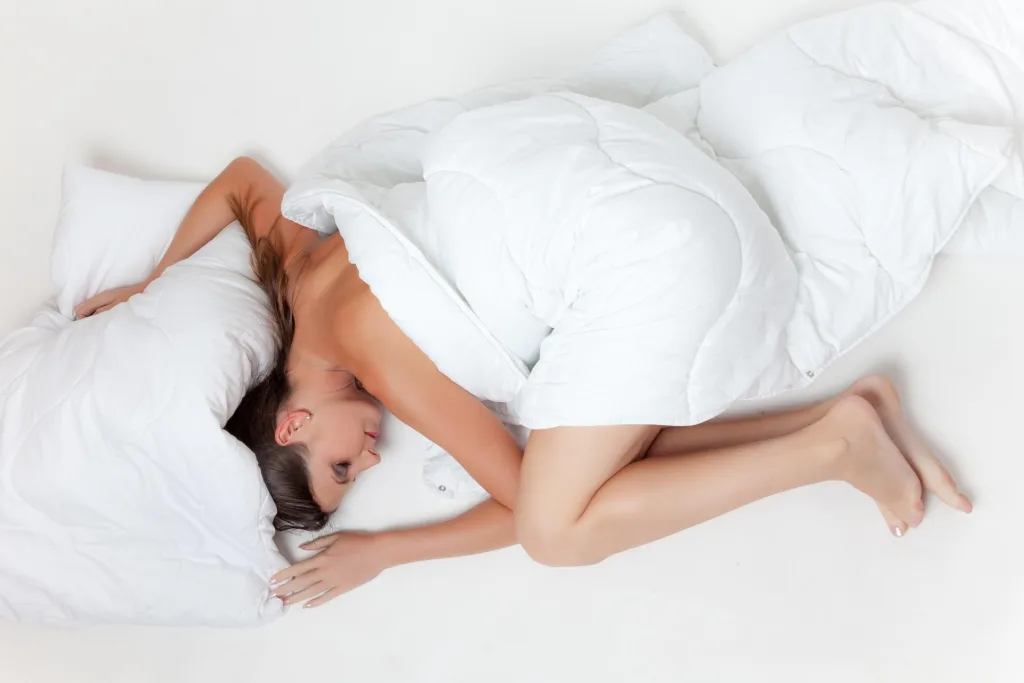
The menstrual cycle is a normal part of a woman’s reproductive health. Sometimes, the menstrual cycle can be unpredictable, especially when there are changes in stress, diet, or hormones. Typically, it occurs every 21 to 35 days.
Many women look for natural methods to induce periods when they are delayed, and the topic of the sleeping position to get periods early often comes into the discussion.
But can how you sleep actually influence your menstrual cycle? This article delves into the myths and facts surrounding sleeping position to get periods early and their potential impact on menstrual health.
In This Article
What Is the Menstrual Cycle?

The menstrual cycle is a hormonal process that prepares a woman’s body for pregnancy each month. The average cycle lasts about 28 days, but it can range from 21 to 35 days. Here are the main stages:
- Menstrual phase: The uterus sheds its lining, which lasts 3-7 days per month.
- Follicular phase: Ovarian follicles begin to mature and estrogen levels increase, which thickens the uterine lining.
- Ovulation: In the middle of the cycle, an egg is released from the ovary, ready for possible fertilization.
- Luteal phase: If fertilization does not occur, hormone levels drop and the body prepares to shed the uterine lining, starting the cycle again.
Sleeping Position To Get Periods Early: Myths or Facts
Though sleeping positions do not have a direct scientific link to inducing an early period, certain positions may help improve blood flow, reduce stress, and relax the body, which could potentially influence menstrual timing slightly. Here are a few sleeping positions that might help:
1. Fetal Position

This position relaxes the abdominal muscles and reduces pressure on the uterus, which can help your period start. To do this, lie down with your knees raised toward your chest, as if you were in a crouched position.
2. Supine Position (Lying on Your Back)

In this position, lying on your back with a pillow under your knees improves blood circulation and reduces abdominal tension. Being in this comfortable position can sometimes help balance hormones.
3. Prone Position (Lying on Your Stomach)
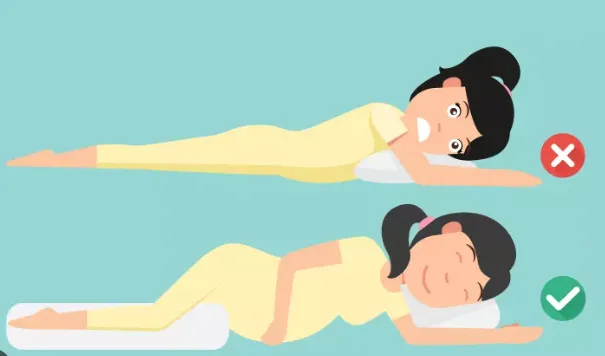
In this position you lying on your stomach and applying gentle pressure to your lower abdomen improves blood flow to the pelvic area, which can help if your period is slightly delayed.
4. Reclining Position with Elevated Legs
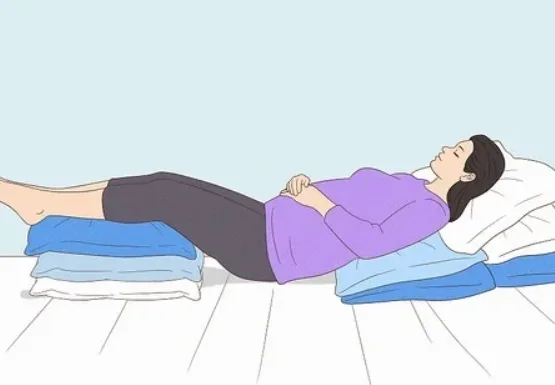
In this position you slightly elevating your legs using pillows improves blood circulation and reduces swelling or pressure, which indirectly helps with menstrual flow.
5. Yoga-Based Resting Positions
- Child’s Pose (Balasana): This yoga pose reduces stress and gently massages the abdominal area, promoting relaxation.
- Supta Baddha Konasana (Reclining Bound Angle Pose): Lying on your back with the soles of your feet together and knees out to the sides helps open up the pelvic area.
Can Sleeping Position Influence Periods?
The menstrual cycle is mainly controlled by hormones like estrogen and progesterone, which are controlled by the hypothalamus and pituitary gland in the brain. Various factors such as stress, body weight, exercise habits, and health conditions can affect your cycle.
Scientifically, there is no strong evidence to suggest that specific sleeping positions can directly induce periods. While some people search for tips on the best sleeping position to get periods early, it’s important to note that hormonal balance plays a more significant role. Therefore, relying solely on a sleeping position to get periods early may not yield effective results.
While sleeping posture can affect blood flow and comfort, it does not have a significant impact on the hormonal mechanisms that trigger menstruation. However, certain positions might help alleviate menstrual discomfort, indirectly promoting a sense of relaxation that could support overall hormonal balance.
You can also read
Popular Beliefs About Sleeping Positions
Despite the lack of scientific backing, several sleeping positions are popularly believed to influence menstruation:
1. Fetal Position
The fetal position involves bending your body and pulling your knees toward your chest. Some people believe that this position encourages uterine contractions due to the slight pressure on the abdomen. While it may provide relief during menstruation, it does not cause menstruation.
2. Lying on the Stomach
Sleeping on your stomach puts gentle pressure on the uterus, which is thought to stimulate menstrual flow. However, there is no scientific support for this belief. This position may help reduce menstrual cramps for some people, but it will not affect when your period starts.
3. Elevated Legs
Elevating your legs while sleeping improves blood circulation, which is good for your body. While good circulation is important for our health, this position does not directly affect menstrual hormones or the onset of menstruation. That is, it will not change your menstrual schedule, but it can help your body relax.
What Actually Helps to Get Periods Early?
If you’re looking to regulate or induce your period naturally, here are some evidence-based methods that may help:
1. Dietary Adjustments
- Papaya: Papaya is rich in carotene, which can help increase estrogen production, which can help with the onset of menstruation.
- Ginger: Ginger is anti-inflammatory and when consumed regularly, it can help increase uterine contractions, which is helpful during menstruation.
- Turmeric: Turmeric increases warmth and can help balance hormones and increase menstrual flow.
- Pineapple: Pineapple contains an enzyme called bromelain, which can help soften the lining of the uterus and promote menstrual flow.
These foods can help influence your menstrual cycle, but should always be consumed in the right amounts.
2. Physical Activity
Light exercises like walking, stretching, and yoga help regulate hormones and promote healthy blood circulation. Cobra Pose (Bhujangasana), Bow Pose (Dhanurasana), and Bridge Pose (Setu Bandhasana) are especially beneficial for menstrual health. These asanas help to flex the body and relax the abdominal muscles, which can provide relief during menstruation. So it’s a good idea to do these types of exercises regularly!.
3. Stress Management
Stress is a major factor in delaying your period. However, practices like meditation, deep breathing exercises, and mindfulness can help reduce stress. These types of practices can help bring your cycle back to normal, so give them a try!
4. Hydration and Warm Compresses
Drinking plenty of water and using warm compresses on your abdomen can help relax the uterine muscles, which can help your period start. So try these two simple remedies!
When to Call a Doctor
It is normal to have irregular periods occasionally, but if it is persistent, it can indicate some health problems.
- Polycystic Ovary Syndrome (PCOS): This is a hormonal problem that can cause irregular periods.
- Thyroid Disorders: hyroid problems, such as hyperthyroidism (overproduction of thyroid hormones) and hypothyroidism (lack of thyroid hormones), can affect the menstrual cycle.
- Amenorrhea: This occurs when there is no menstruation for three or more consecutive menstrual cycles.
- Extreme Weight Changes: If you lose or gain weight significantly, it can disrupt the hormonal balance.
Any of these problems may apply to you, so if you are having menstrual problems, it is a good idea to consult a doctor.
Consult a healthcare professional if you experience:
- Missed periods for more than three months (without pregnancy).
- Severe pain during periods.
- Unusually heavy bleeding.
- Signs of hormonal imbalance, such as excessive hair growth, acne, or weight changes.
Conclusion
Many people believe that certain sleeping position to get periods earlycan help start your period, but there is no scientific evidence to support this. The menstrual cycle is actually controlled by complex hormonal processes, which are independent of sleep position. So while changing your sleeping position may seem like an easy fix, it has no real effect.
Instead, maintaining a healthy lifestyle, managing stress, eating a balanced diet, and getting light exercise can support your menstrual health. If you are experiencing persistent irregular periods, it is important to consult a healthcare provider. Prioritize your health and well-being over quick fixes or myths.


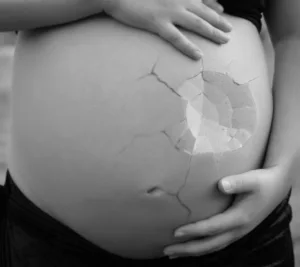

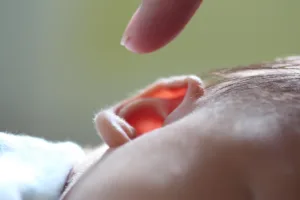





























2 thoughts on “5 Effective Sleeping Position To Get Periods Early: Myths or Facts”